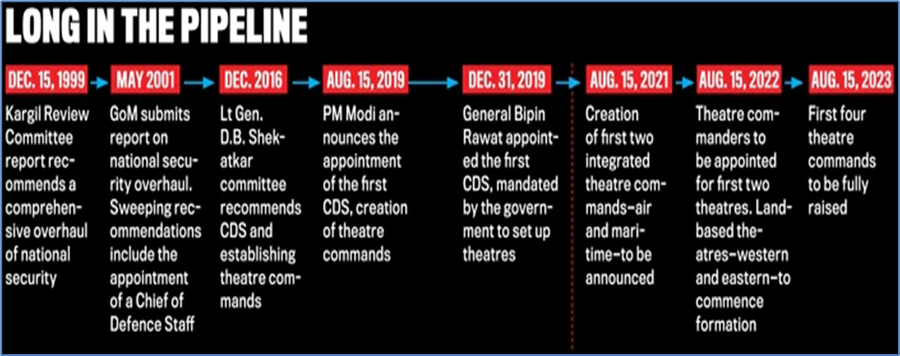Why in News?
- According to government officials, the armed forces are finalizing theaterisation plans that seek to integrate the Army, Navy and Indian Air Force, as well as their resources, into specific theater commands.
What’s in today’s article?
- What does the Word 'Theatre' Mean and Where did it Come from?
- Why does India Seek Theatre Commands?
- News Summary with respect to the Theaterisation in India
What does the Word 'Theatre' Mean and Where did it Come from?
- Theatre is used to refer the entire land, sea and air areas that is or may become involved directly in war operations.
- The word ‘theatre warfare’ became more prominent during World War II with the battles being fought across continents.
- As of now, almost all major countries like China, Russia, the US, the UK and France work on a theatre command concept.
- For example, China’s (latest entrant to a theatre concept) Western Theater Command looks after the entire borders with India.
- In India, the need for a unified approach was brought out after the 1999 Kargil battle.
- The Kargil Review Committee, the Naresh Chandra Committee and the Group of Ministers had called for structural changes in higher defence management.
- It was the Shekatkar committee, which had recommended the creation of the post of Chief of Defence Staff (CDS) and theatre commands.

Why does India Seek Theatre Commands?
- India currently has 19 military commands with 17 of them service-oriented (7 each for Army and the Air Force and the Navy has 3).
- India also has a Tri-Service Command - Andaman and Nicobar Command, besides the Strategic Forces Command (SFC), which looks after the country’s nuclear stockpile.
- The aim is to bring all the 17 individual commands into four or five unified or theatre commands. It might also have two more functional commands for training and logistics.
- The rationale is that this will aid in better planning and military response (a unified approach to fighting the future wars) by integrating 3-services as well as their resources, into specific theater commands.
- While the initial cost may be higher, it will be more cost-effective in the long run because all acquisition will be unified.
- The acquisition of Apache attack helicopters from the US is a classic example of the dangers of not having a unified approach to acquisition.
- While the Indian Air Force got 22 Apaches, the Army has also placed orders for six of these choppers.
- The end result - loss of at least Rs 2,500 crore and haphazard operational planning.
News Summary with respect to the Theaterisation in India:
- What are the theatre proposals?
- There will be 4 theatres -
- Northern and Eastern Theatre (China centric)
- Western Land Theatre (Pakistan centric)
- Maritime Theatre Command, will see a merger of the eastern and western naval commands, besides getting elements from the Army and the Air Force.
- Air Defence Command
- Also under discussion is the creation of a joint training command. Three joint logistics nodes had already been operationalised until 2021.
- Threats emanating from China, Pakistan and via the sea routes are being factored in the plans for theatre commands which will integrate resources of the Army, Navy, IAF.
- What are the concerns related to proposals?
- The previous plan called for the Army's Northern Command and the Indian Air Force's Air Officer Commanding Jammu, Kashmir and Ladakh to operate separately from the theatre commands, as integration would divide their fighting assets.
- Multiple studies were conducted over the last two years, but the plans were delayed after CDS General Bipin Rawat died in a helicopter crash in December 2021.
- However, after the current CDS, General Anil Chauhan, took over in September last year, the plans picked up again.
- Way ahead with respect to the theatre commands:
- The theatre commands should be future-ready to deal with the emerging forms of warfare in the space and cyber domains.
- They should not increase the decision-making chains from the existing levels.
- According to the former Army chief (General Naravane (retd)), a national security strategy should be in place, before theaterisation.
- To get the most out of the theatre commands, the right tri-service structures must be in place.










